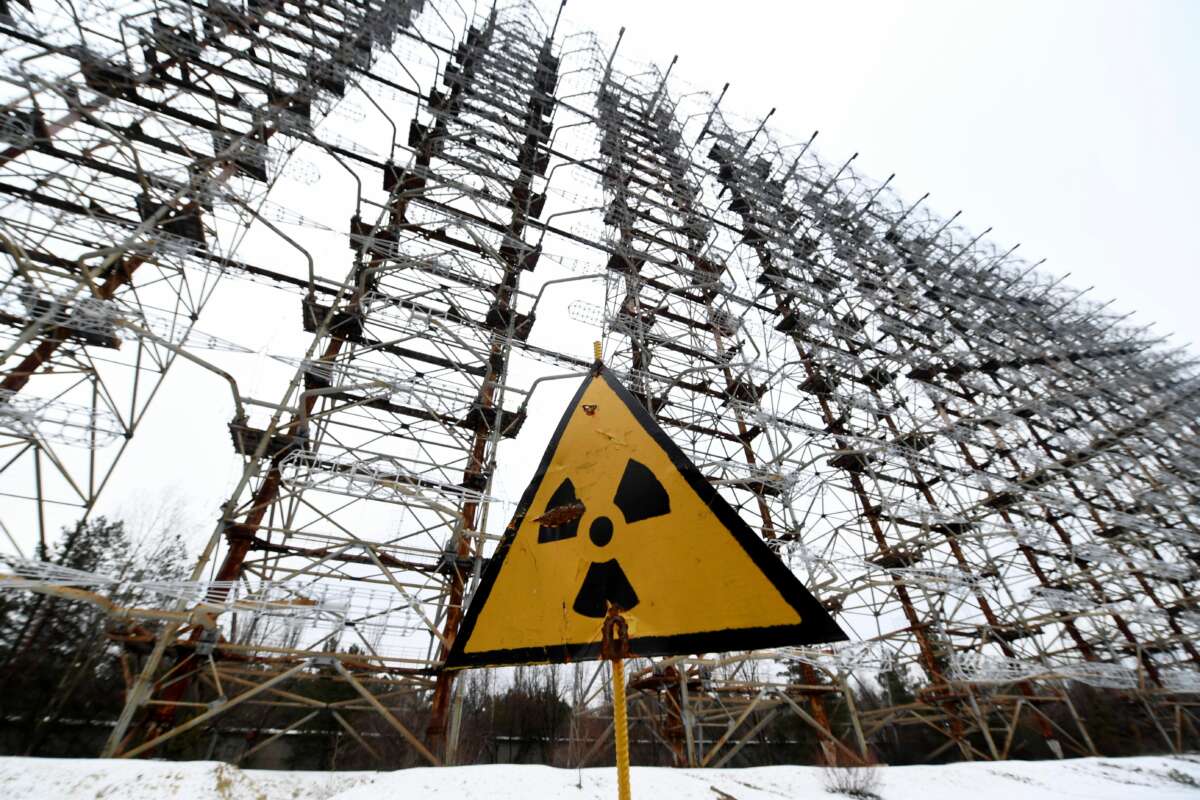Honest, paywall-free news is rare. Please support our boldly independent journalism with a donation of any size.
As we pass the one-year anniversary of the Ukraine War, we are reminded of the pain and suffering of Ukrainian people whose country has been ravaged by war, Russian mothers whose sons will never return home, and all who have been affected deeply by the global food and energy crisis this war has engendered. While there is little room for optimism in the bleak picture, one possible silver lining is that the war has brought the question of nuclear weapons back into the public conversation.
Many of these conversations have veered from the utterly unreasonable, including veiled and unveiled threats by the Russian regime, to seemingly cavalier discussions by corporate media of the use of tactical nuclear weapons. However, the conversation we should be having is not about their use but global disarmament.
President John F. Kennedy warned that the continued existence of nuclear weapons threatened humanity’s very survival, in his address to the United Nations in 1961, more than 60 years ago. Today our understanding of nuclear weapons and their consequences is significantly better, but the obvious conclusion is the same: they must go.
If Nukes Were Used, Mass Death and Suffering Would Be Unavoidable
Nuclear weapons are now much more powerful than those dropped by the U.S. on the Japanese cities of Hiroshima and Nagasaki during World War II. Even a single nuclear attack on a city today could kill and sicken millions of people. A nuclear war would likely destroy multiple cities, like a massive earthquake, wildfire, hurricane and nuclear disaster all happening at once, with no possibility of an adequate humanitarian response.
Those evaporated by the blast would be the fortunate ones.
We have been told by our government, over and over again, that nuclear weapons have kept us safe. But that is categorically false. Dozens of incidents brought us tremendously close to nuclear weapons use — by accident, miscalculation, or deliberative decision (think Cuban missile crisis). “Luck is not a strategy,” UN Secretary General Antonio Guterres said last year.
This status quo cannot continue indefinitely.
Nuclear weapons testing programs have also caused tremendous harm to people around the planet. From Pacific islands and atolls of the Marshall Islands, Kiribati and French Polynesia, to the deserts of the American Southwest, Kazakhstan, Algeria, Australia and western China, vulnerable and often Indigenous populations suffered physical and mental health impacts, elevated cancer rates, miscarriages, birth defects, contaminated food and water, relocation, loss of tradition and cultural demise. The affected communities have yet to be properly compensated and acknowledged for their loss and suffering.
Today, nine countries have about 13,000 nuclear warheads, of which more than 90 percent are in the arsenals of U.S. and Russia. According to a recent study, if both countries used about one-third of their current arsenals in a nuclear war, more than 5.4 billion people, or more than 68 percent of the global population, would die from starvation. In the case of an India-Pakistan nuclear war, more than 2 billion people would die from lack of food.
The consequence of any nuclear war would be nuclear winter: widespread fires caused by the bombings would inject soot into the atmosphere, block incoming sunlight, reduce temperatures and impair agricultural production. As a result, people around the world would die of starvation.
Given that humanity’s very survival is at stake, all countries, not just those vulnerable to direct attack, should care about this issue.
Prospects for Disarmament
Many countries have stepped up to the plate, negotiating, signing and ratifying the Treaty on the Prohibition of Nuclear Weapons (TPNW). The TPNW bans any and all activities having to do with nuclear weapon, including threats to use them. It also has humanitarian provisions for those impacted by their use and testing.
This historic treaty is our best hope for a world free of nuclear weapons. So far, 68 countries have ratified the TPNW and 92 have signed it. As that number continues to grow, pressure on the nine countries that possess nuclear weapons to finally disarm will continue to rise, eventually leading to removal of the nuclear shadow over all of humanity.
A Scientific Advisory Group to the TPNW, of which I am a member, was constituted in February and held its first meeting on March 1. This group is tasked with advising the states parties on various scientific aspects of the treaty. Our goal is to enable the TPNW to fulfill all of its promises, including on assisting nuclear victims and remediating their environments. Nothing less will do.
Media that fights fascism
Truthout is funded almost entirely by readers — that’s why we can speak truth to power and cut against the mainstream narrative. But independent journalists at Truthout face mounting political repression under Trump.
We rely on your support to survive McCarthyist censorship. Please make a tax-deductible one-time or monthly donation.
